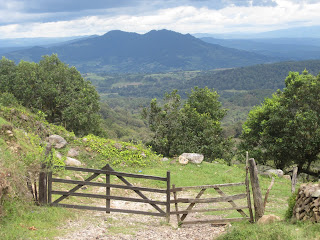Today is election day here in Nicaragua, and as Nicaraguans head to the polls to vote, I want to try and give you a bit of an insight into Nicaraguan politics to help you understand both the importance of this election and the fragile state of democracy here.
To have any hope of understanding the current political situation, it's worth taking a minute to look at the past. Last week, I finished an incredibly well-written book about Nicaraguan politics called
Blood of Brothers, written by former New York Times correspondent Stephen Kinzer about Nicarguan history and the war in the 1980s and 1990s. I would highly recommend the book to anyone interested in the history of this little country, and will personally buy you a copy if it's not at your local library and you want to read it (yes, I think it's that important to understand more of the history of Nicaragua and Central America). But here's your one paragraph summary: after a 43 year dictatorship by the Somoza family, they were overthrown in 1979 by a political group called the Sandinistas. The Sandinistas were named after a man named Sandino who, in the 1930s, launched a guerilla war against the pro-U.S. government. After the Sandinistas took power, they themselves started to resemble a dictatorship, and many of the things they had fought against (censorship of the press, large human rights violations, etc.) were still occurring. So the contras (literally meaning "against") began to form an army, mostly based in Honduras, to have a second revolution. This led to a long and violent war - many of the contras were from Somoza's National Guard, and were incredibly brutal. The contras were illegally supported
by the Reagan administration (many of you may remember the Iran-contra affair, where money from weapons sold to Iran went to help the contras here in Nicaragua). A peace agreement was finally reached in the 80s, and Nicaragua has been a democracy ever since, with multiple different political parties holding power during the past 30 years.
Daniel Ortega, the current president, was a big-shot in the FSLN (Sandinista party) during the revolution, and was president in the 1980s before losing power in a 1990 election. He then ran and lost in every election, until the 2006 election where he won again after, through a pact with then-president Arnoldo Aleman and his political party, changing the Constitution to allow a candidate to win with only 35% of the vote. The Constitution forbids a president from running again while in office, so Ortega shouldn't be running in this election. However, the Supreme Court (controlled by the FSLN party) ruled that it was a violation of Ortega's human rights not to allow him to run again, and changed the Constitution to allow him to do so. The other two candidates in the election are Fabio Gadea, a 79 year old from the radio industry, and Arnoldo Aleman, another former president who was EXTREMELY corrupt during his presidency in the 1990s. It's widely belived that Aleman is running as a way to thank Ortega for getting him out of arrest (for embezzlement of funds during his presidency), and is splitting the opposition vote to help Ortega win.
Still with me? That was a lot of information in two paragraphs, but I think it's important to understand the background. My point in telling you all of that was to make it clear that even though this election is "free" and "democratic", there's obviously been a lot of sketchy events to get us to this point. There have also been accusations of the FSLN-controlled voting authority expediting voter applications for Sandinistas and not having time to give IDs to the opposition. Ortega held 58% of the vote in the last poll, with Gadea having 15% and Aleman having 3%. This is not unexpected given that Ortega has used lots of money (mostly from his buddy Hugo Chavez in Venezuela) to have a HUGE campaign, and limited the campaigns of his opposition. He's also started handing out a lot more food, generally being more helpful, and doing things like improving roads in the past few months before the election. He also refused international observance of the election until very recently, meaning that all of the sketchy things were done before any observers were allowed to be here.
All signs point towards Ortega being reelected today, and many people who are a lot smarter than me believe this could be the beginning of the next dictatorship here in Nicaragua, under the guise of a fragile democracy which may not survive this election or another term of Ortega's leadership. If nothing else, I ask you to pray for wisdom for the Nicaraguans voting today, as well as for the leadership they elect.
In lighter news, the FSLN party was more or less sued for copyright infringement since their main campaign song is a rewritten version of "Stand by Me"...check it out here: http://www.youtube.com/watch?v=hRixNma7loM&feature=player_embedded
Lastly, if you'd like to read more, here are some interesting articles from the Economist and the Washington Post:
http://www.economist.com/node/21536629
http://www.washingtonpost.com/opinions/why-nicaragua-matters-to-the-united-states/2011/11/03/gIQACFOvjM_story.html?wprss=rss_opinions
http://www.washingtonpost.com/world/americas/guatemala-nicaragua-go-to-the-polls/2011/11/05/gIQAPZs1pM_story.html






